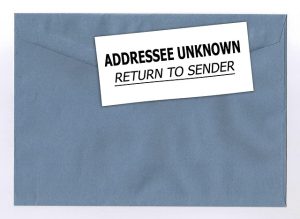How many times does a leaseholder tell you that they haven’t paid because “I never received the demand – you sent it to the wrong address”?
Jonathan Watts, Operations Director at Brady Solicitors, sets out a reminder on the statutory provisions, and looks at what a Court of Appeal case had to add on the subject.
The statutory provisions first.
So far as ground rent is concerned, we need to consider the relevant provisions of the Commonhold and Leasehold Reform Act 2002.
S.166 (5) (b) says the notice may be sent by post.
S.166 (6) goes onto say that if the notice is sent by post, it must be addressed to a tenant at the property address unless he has notified the landlord in writing of a different address in England and Wales at which he wishes to be given notices under this section (in which case it must be addressed to him there).
It is not mandatory to send ground rent demands by post, hence the use of the word “may” in (5) (b) and “if” in (6).
However, if you do choose to send the ground rent demand by post, the section makes it mandatory that the demand must be addressed to the tenant at the property address unless the tenant has given a different address in which case that one must be used.
And what about for service charges?
S.166 of the CLRA does not apply to service charges and there is no specific statutory provision relating to where a service charge demand should be sent.
However, a similar approach to the one under s.166 is adopted, with the demands being sent to the property address unless an alternative address has been provided, which is reflected by the practice on registration of the leasehold title and the completion of the Proprietorship Register at the Land Registry.
This register is governed by the Land Registration Rules 2003, and Rule 198 provides that the owner must give an address for service to which all notices and other communications may be sent to him by the registrar.
These rules were recently considered by the Court of Appeal in the case of Oldham Metropolitan Borough Council –v- Tanna (2017) EWCA Civ 50.
The court said that, as the address is an “address for service” and it appears in a public part of the register, this indicates that its use is not necessarily confined to the service by the registrar of notices or communications on the owner.
In other words, the Court of Appeal found that the address provided to the Land Registry by the proprietor could be used to serve demands – providing no other address had been given.

Further it was held that “as a general rule, unless there is a statutory requirement to the contrary, in a case in which a person wishes to serve notice relating to a particular property on the owner of that property and title to that property is registered at HM Land Registry that person’s obligation to make reasonable inquiries goes no further than to search the proprietorship register to ascertain the address of the registered proprietor. It is the responsibility of the registered proprietor to keep his address up to date. If the person serving the notice has actually been given a more recent address than that shown in the proprietorship register as the address or place of abode of the intended recipient of the notice, then the notice should be served at that address also.”
Again, to paraphrase: it is the leaseholder’s responsibility to keep their address up to date.
And, if the leaseholder provides a more recent address than that held at the Land Registry then you should send demands to both addresses.
This decision is to be welcomed as Court of Appeal authority that:
- A leaseholder is under an ongoing duty to keep his address details up to date at the Land Registry;
- If provided with an address which differs to the one in the register, that address should also be used for service of notices or communications (which would include service charge demands);
- The obligation to make enquiries as to the leaseholders’ address for service is limited to a search of the proprietorship register at the Land Registry.

